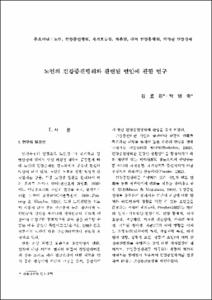노인의 건강증진행위와 관련된 변인에 관한 연구
- Keimyung Author(s)
- Park, Yeong Sook
- Department
- Dept. of Nursing (간호학)
- Journal Title
- 기본간호학회지
- Issued Date
- 1997
- Volume
- 4
- Issue
- 2
- Abstract
- This study was undertaken to grasp health-promoting behavior of the elderly and to identify variables related to them in order to facilitate nursing intervention for health promotion of this population. The subjects for this study were 291 old persons obtained by cluster sampling from twenty general social welfare centers located in Tague. Data were collected by self-reported questionnaires from August 13 to September 13, 1996. Questionnaires were developed based on Sherer and others' Self-Efficacy scale, Rosenberg's Self-Esteem scale, Wallston and other's Multidimensional Health Locus of Control scale, Northern illinois University's Helath Self Rating Scale, Walker and others' Health Promotion Lifestyles Profile. Analysis of the data was done by use of descriptive statistics, stepwise multiple regression, Pearson Correlation Coefficient, MANOVA, t-test, and ANOVA. The results were summarized as follows : 1. For the practice of health-promoting behavior, the mean score was 2.89 and range was 3.59 to 2.09. The factor of the highest mean score was regular diet(M=3.42) and factor of the lowest mean score as stress management(M=2.27). 2. The combination of self-efficacy, internal health locus of control, family number, and average monthly pocket money explained 30.0% of the variance of health-promoting behavior. 3. With regard to the relationship between health-promoting behavior and cognitive perceptual factor, self-efficacy correlated positively with health-promoting behavior(r=.4951, P=.0001), self-esteem correlated positively(r=.3263, P=.0001), internal health locus of control correlated positively(r=.3244, P=.0001), perceived health status correlated positively(r=.1355, P=.0274). 4. According to age(F=2.50, P=.0431), sex(t=2.14, P=.0332), marital status(F=7.85, P=.0005), education(F=5.44, P=.0003), family number(F=11.18, P=.0001), people living together(F=7.21, P=.0009), previous occupation(F=5.83, P=.0001), average monthly pocket money(F=7.27, P=.0001), there were differences of health-promoting behavior. The above findings show that health-promoting behavior are related to demographic characteristics, four cognitive perceptual factors(self-efficacy, self-esteem, internal health locus of control, perceived health status). On the basis of the above findings the following recommendations are made ; 1. Nursing interventions enhancing exercise or activity, accountability for health, stress management of the elderly must be provided. 2. Nursing strategies enhancing self-efficacy which is most significant effect on health-promoting behavior must be developed.
Key words: the elderly
health-promoting behavior
self-efficacy
self-esteem
internal health locus of control
perceived health status
- Alternative Title
- Determinants of Health-Promoting Behavior in the Elderly
- Keimyung Author(s)(Kor)
- 박영숙
- Publisher
- College of Nursing
- Citation
- 김효정 and 박영숙. (1997). 노인의 건강증진행위와 관련된 변인에 관한 연구. 기본간호학회지, 4(2), 283–300.
- Type
- Article
- ISSN
- 1225-9012
- Appears in Collections:
- 2. College of Nursing (간호대학) > Dept. of Nursing (간호학)
- 파일 목록
-
-
Download
 oak-bbb-00212.pdf
기타 데이터 / 1.01 MB / Adobe PDF
oak-bbb-00212.pdf
기타 데이터 / 1.01 MB / Adobe PDF
-
Items in Repository are protected by copyright, with all rights reserved, unless otherwise indicated.